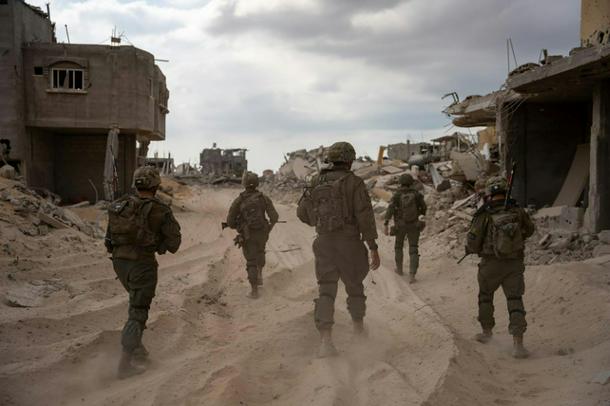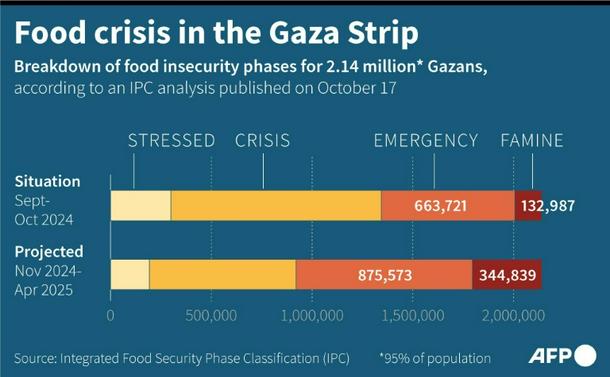
Security forces and emergency services swarmed the street leading to Israeli Prime Minister Benjamin Netanyahu's residence in Caesarea after a drone attack
Jerusalem (AFP) - Israel said a drone targeted Prime Minister Benjamin Netanyahu’s residence on Saturday, as Hezbollah launched a barrage of projectiles into Israel from its northern neighbour Lebanon.
On the southern front, Israel hammered Gaza with air strikes, with an overnight raid on Jabalia in the north killing 33 people, according to the besieged civil defence agency.
Netanyahu’s office said the prime minister and his wife were not at their residence in the central town of Caesarea during the drone attack and there were no injuries. Earlier, the military said a drone launched from Lebanon had “hit a structure” in Caesarea.
Sirens blared across Israel throughout the morning as Hezbollah fired projectiles from various locations in Lebanon.

Relatives pray over the shrouded body of ten-year-old Sama al-Debs, who was killed during an Israeli army operation in the Jabalia refugee camp in the central Gaza Strip
The Iran-backed group said it launched a large salvo of advanced rockets at a military base in Israel’s Haifa region.
A man in the northern Israeli port city of Acre died after being struck by shrapnel, the Magen David Adom emergency service said, while shrapnel also wounded five people in the Haifa city of Kiryat Ata.
Late last month Israel ramped up air strikes on Lebanon and deployed ground forces after nearly a year of cross-border exchanges.
The fighting in Gaza came after the Israeli military killed Hamas leader Yahya Sinwar on Wednesday.

Yahya Sinwar was Israel's most wanted man and was accused of masterminding the October 7 Hamas attack
Sinwar, accused of masterminding the October 7 attack on Israel, was seen as pivotal to ending the Gaza war and securing the release of Israeli hostages.
On Friday, Qatar-based Hamas official Khalil al-Hayya reiterated no hostages would be freed “unless the aggression against our people in Gaza stops”.
Iranian supreme leader Ayatollah Ali Khamenei, whose country also backs Hamas, said the group “will not end at all with the martyrdom of Sinwar”.
- ‘The killings continue unabated’ -
As fighting raged in Gaza, civil defence agency spokesman Mahmud Bassal announced “33 deaths and dozens of wounded” in an Israeli strike on the northern area of Jabalia overnight.
The Israeli military said it was “looking into it”.
Early on Saturday, three houses in the Jabalia refugee camp were targeted, the civil defence agency said, while witnesses told AFP there was heavy gunfire and shelling in the direction of the camp.
Israeli forces have focused their attacks on northern Gaza, where they say Hamas is regrouping.
Witnesses also reported Israeli shelling in central Gaza’s Al-Bureij camp.

Israeli troops in the Rafah area of Gaza
Israeli forces, accused of targeting health facilities, were shelling Indonesian Hospital in north Gaza, medics there said.
The violence has dashed hopes Sinwar’s death might bring the war closer to an end.
“We always thought that when this moment arrived, the war would end and our lives would return to normal,” 21-year-old Gazan Jemaa Abu Mendi said.
“But unfortunately, the reality on the ground is quite the opposite. The war has not stopped, and the killings continue unabated.”
- Calls for hostage release, end of war -
Netanyahu said that while Sinwar’s killing did not spell the end of the war, it was “the beginning of the end”.

Gaza is experiencing a severe food crisis, with the United States and other warning not enough aid is reaching Palestinians
US President Joe Biden, along with the leaders of Germany, France and Britain, urged “the immediate necessity to bring the hostages home to their families, for ending the war in Gaza, and ensure humanitarian aid reaches civilians”.
In August, Netanyahu called Sinwar “the only obstacle to a hostage deal”.
Ayala Metzger, daughter-in-law of killed hostage Yoram Metzger, said with Sinwar dead it was “unacceptable” that hostages remained in captivity.
An Israeli autopsy found Sinwar was initially wounded in the arm by shrapnel, but killed by a gunshot to the head, the New York Times reported. The circumstances of the shot remain unclear.
- ‘Hell on Earth’ -
Hamas sparked the war in Gaza with its October 7 attack last year that resulted in the deaths of 1,206 people, mostly civilians, according to an AFP tally of official Israeli figures.

People attend Friday prayers in the damaged 13th-century Great Omari Mosque in the old town of Gaza City
During the attack, militants took 251 hostages back into Gaza. Ninety-seven are still being held there, including 34 who the Israeli military has confirmed are dead.
Israel’s campaign to crush Hamas and bring back the hostages has killed 42,519 people in Gaza, mostly civilians, according to data from the health ministry in the Hamas-run territory, figures the UN considers reliable.
A conservative estimate puts the death toll among children in Gaza at over 14,100, said James Elder, spokesman for the United Nations children’s agency UNICEF.
For the one million children in the besieged territory, “Gaza is the real-world embodiment of hell on Earth”, he said.
Criticism has been mounting over the civilian toll and lack of food and aid reaching Gaza, where the UN has warned of famine.
- ‘Serious’ possibility of regional war -
There is also growing concern about the toll in Lebanon, where Israel is fighting a war with Hamas ally Hezbollah.

A billboard bearing a portrait of Hamas' slain leader Yahya Sinwar is seen in Tehran
Lebanon’s health ministry said two people were killed in an Israeli strike on a vital highway north of Beirut on Saturday.
Since late September, the war has left at least 1,418 people dead in Lebanon, according to an AFP tally of Lebanese health ministry figures, though the real toll is likely higher.
The war has also drawn in other Iran-aligned armed groups, including in Yemen, Iraq and Syria.
On Friday and Saturday, the Israeli military reported drones being launched from Syria.
Iran conducted a missile strike on Israel on October 1, for which Israel has vowed to retaliate.
Iranian Foreign Minister Abbas Araghchi said on Saturday that the “possibility of war in the region is always serious”.
“We want to reduce tensions, but.. we are ready for any scenario.”
burs-dcp/dl/dv